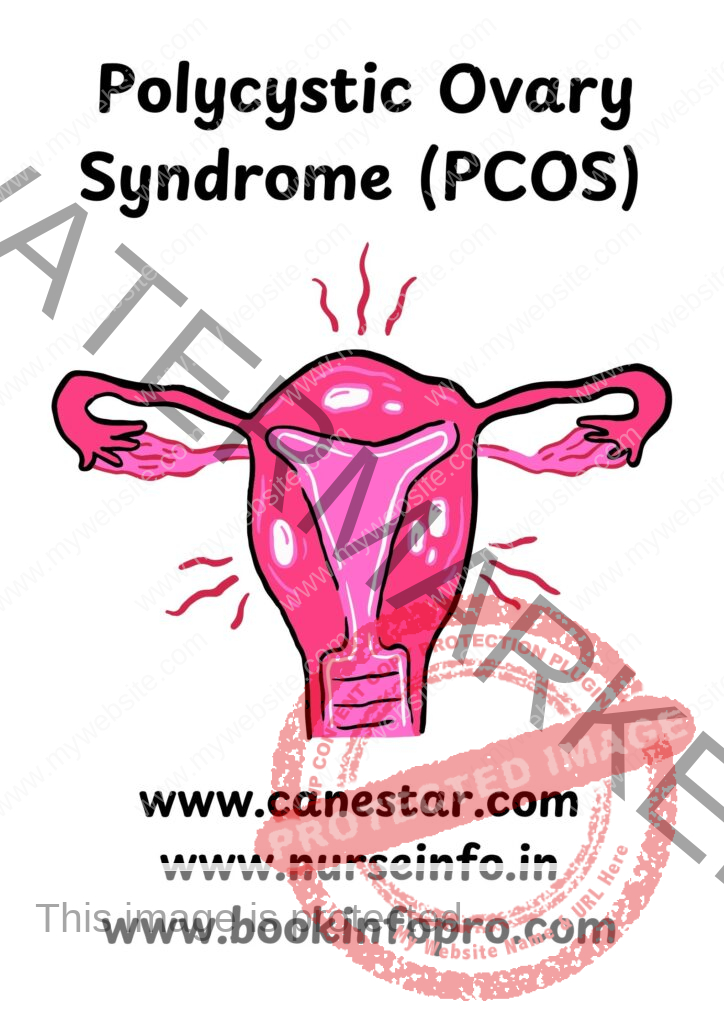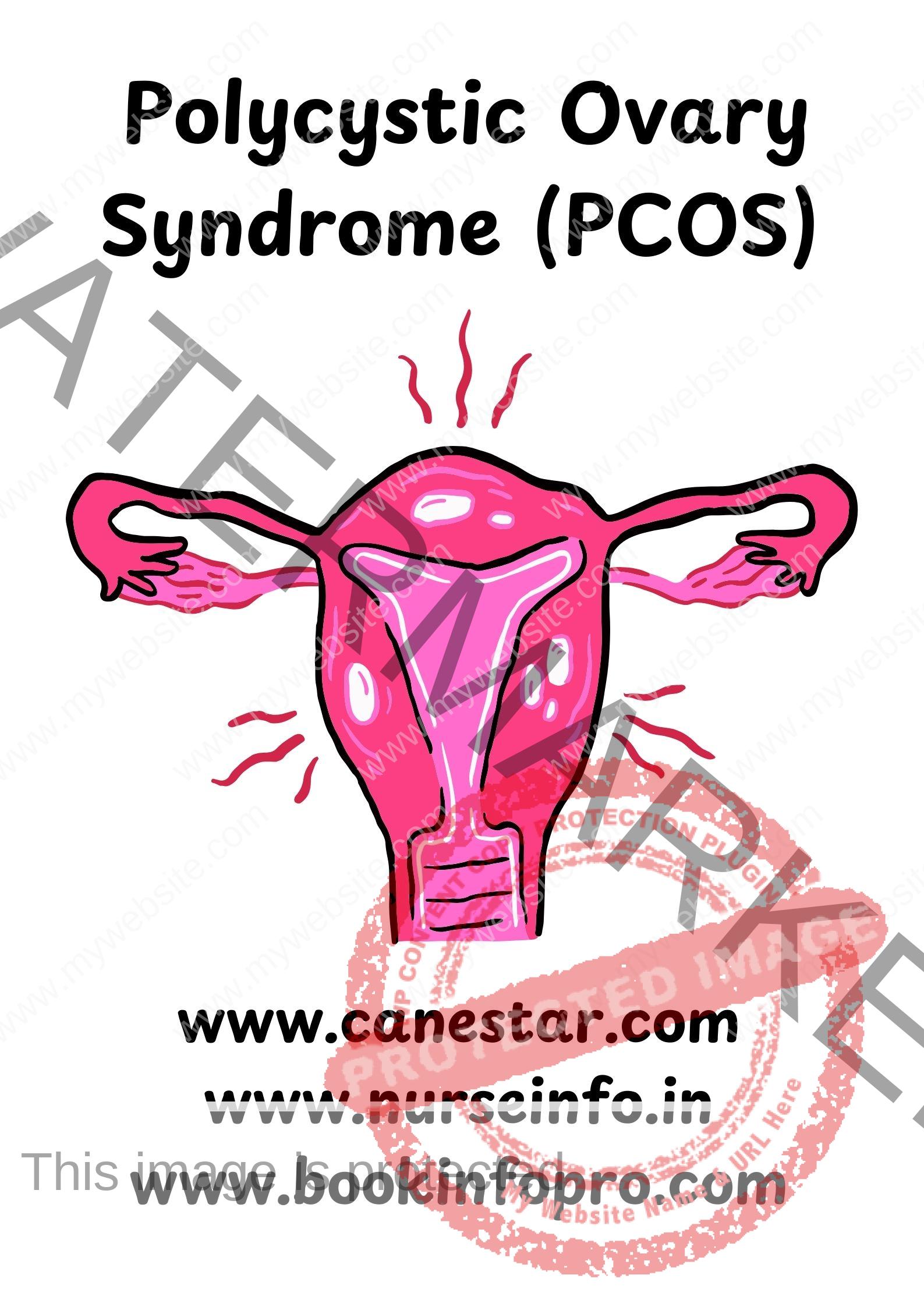Polycystic ovary syndrome (PCOS) – Definition, types, causes, signs and symptoms, diagnosis, treatment and prevention
Polycystic ovary syndrome (PCOS) – Definition, types, causes, signs and symptoms, diagnosis, treatment and prevention
Polycystic Ovary Syndrome (PCOS) is a common hormonal disorder that affects women of reproductive age. It is characterized by irregular menstrual cycles, excess androgen levels (male hormones), and polycystic ovaries (enlarged ovaries containing small cysts).
Causes of PCOS:
The exact cause of PCOS is unknown, but several factors may contribute to its development, including:
Genetics: PCOS tends to run in families, suggesting a genetic component.
Insulin Resistance: Many women with PCOS have insulin resistance, meaning their bodies produce more insulin to manage blood sugar. Excess insulin may stimulate the ovaries to produce more androgens (male hormones), leading to symptoms of PCOS.
Inflammation: Low-grade inflammation is common in women with PCOS, and it may contribute to the production of excess androgens.
Hormonal Imbalance: Increased levels of androgens (testosterone and other male hormones) interfere with the development and release of eggs from the ovaries.
Symptoms of PCOS:
The symptoms of PCOS vary from woman to woman, but common signs include:
Irregular Periods:
- Infrequent, prolonged, or absent menstrual cycles.
- Heavy bleeding during periods.
Excess Androgen Levels:
- Excess facial and body hair (hirsutism).
- Severe acne.
- Male-pattern baldness (thinning hair on the scalp).
Polycystic Ovaries:
- Ovaries may be enlarged with multiple small cysts visible on ultrasound.
- This doesn’t necessarily mean that every woman with PCOS has ovarian cysts.
Weight Gain or Difficulty Losing Weight:
- Many women with PCOS are overweight or obese, and they often struggle to lose weight.
Infertility:
- PCOS is one of the most common causes of infertility due to ovulatory dysfunction.
Skin Changes:
- Dark patches of skin (acanthosis nigricans), particularly on the neck, groin, or under the breasts.
- Skin tags (small, excess growths of skin).
Mood Disorders:
- Depression, anxiety, or mood swings are common in women with PCOS, possibly due to hormonal imbalances.
Metabolic Issues:
- Many women with PCOS are at a higher risk of developing type 2 diabetes, high cholesterol, hypertension, and cardiovascular disease.
Diagnosis of PCOS:
PCOS is typically diagnosed based on clinical symptoms, medical history, and physical exams. There is no single test to diagnose PCOS, but common diagnostic measures include:
Medical History and Symptoms: Irregular periods, signs of hyperandrogenism (excess androgen), and difficulty with weight management.
Pelvic Examination: To check for signs of ovarian enlargement or other abnormalities.
Ultrasound: Imaging of the ovaries to check for multiple small cysts and ovarian enlargement.
Blood Tests:
- Hormone levels: Measuring androgen levels, luteinizing hormone (LH), follicle-stimulating hormone (FSH), and thyroid hormones.
- Glucose tolerance test and fasting insulin levels to assess insulin resistance.
- Lipid profile to evaluate cholesterol and triglycerides.
Treatment of PCOS:
While there is no cure for PCOS, treatments focus on managing symptoms and reducing the risk of long-term complications. Treatment varies depending on whether the woman is looking to manage symptoms or improve fertility.
Lifestyle Changes:
- Weight loss through a healthy diet and regular exercise can significantly improve symptoms and increase the likelihood of ovulation.
- Healthy eating habits: A diet low in refined carbohydrates and high in fiber can help manage insulin levels and reduce weight.
- Exercise: Regular physical activity improves insulin sensitivity and helps manage weight.
Medications:
- Hormonal Birth Control: Combination pills, patches, or vaginal rings containing estrogen and progestin can help regulate the menstrual cycle, reduce androgen levels, and control hirsutism and acne.
- Progestin therapy: If hormonal birth control is not an option, progestin can regulate menstruation without affecting androgen levels.
- Anti-androgen medications: Drugs like spironolactone reduce the effects of androgens and can help with excess hair growth and acne.
- Metformin: Commonly used to treat type 2 diabetes, metformin improves insulin resistance and can help regulate the menstrual cycle and promote weight loss.
- Clomiphene or Letrozole: Medications used to stimulate ovulation in women seeking to become pregnant.
Fertility Treatment:
- Ovulation induction: Medications like clomiphene or letrozole can help stimulate ovulation.
- In vitro fertilization (IVF): May be considered if other fertility treatments are unsuccessful.
Hair Removal and Skin Care:
- Laser hair removal or electrolysis can help manage unwanted hair.
- Topical treatments and medications may help with acne.
Long-Term Complications of PCOS:
Women with PCOS are at increased risk for several health issues:
Type 2 Diabetes: Due to insulin resistance.
Infertility: Related to irregular ovulation.
Obesity: Many women with PCOS are overweight, which can exacerbate symptoms.
Metabolic Syndrome: A combination of high blood pressure, high cholesterol, and increased risk of heart disease.
Endometrial Cancer: Long-term absence of ovulation and irregular periods can lead to a buildup of the uterine lining, increasing the risk of endometrial cancer.
Sleep Apnea: Especially in women who are overweight.
Mood Disorders: Increased risk of depression and anxiety.
Prevention and Management:
There is no way to prevent PCOS, but managing symptoms and adopting a healthy lifestyle can help reduce the severity of the condition and prevent complications:
- Maintain a healthy weight through diet and exercise.
- Regular health check-ups to monitor blood sugar, cholesterol, and reproductive health.
- Follow prescribed medication regimens to control hormone levels, reduce symptoms, and prevent complications.
Prognosis:
With proper management, women with PCOS can control symptoms and lead healthy lives. Early diagnosis and treatment are important to prevent long-term complications such as diabetes, heart disease, and infertility.


